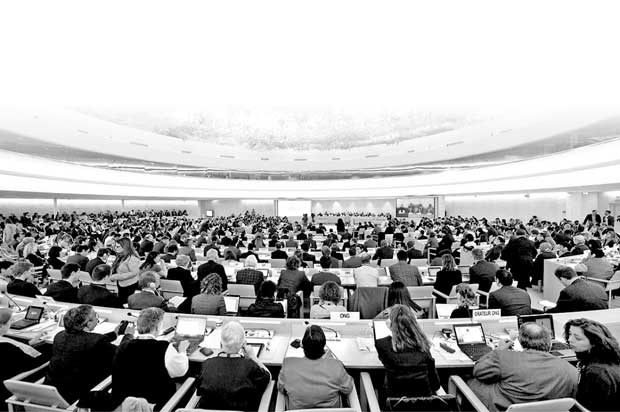Reply To:
Name - Reply Comment
Last Updated : 2024-04-25 20:04:00

 At the current 34th sessions of the UNHRC the draft resolution on ‘Reconciliation, accountability and human rights’, to be placed before the Council shortly, requests Sri Lanka to fully implement the measures identified in HRC Resolution 30/1 that are outstanding, while extending the time limit. In this context we have to once again look to the setting up of judicial mechanisms for accountability in respect of violations of human rights and international humanitarian law, and the question of Hybrid courts.
At the current 34th sessions of the UNHRC the draft resolution on ‘Reconciliation, accountability and human rights’, to be placed before the Council shortly, requests Sri Lanka to fully implement the measures identified in HRC Resolution 30/1 that are outstanding, while extending the time limit. In this context we have to once again look to the setting up of judicial mechanisms for accountability in respect of violations of human rights and international humanitarian law, and the question of Hybrid courts.
Before we do so we have to clear our minds of certain preconceptions and view this question within the context of the global international scene. In Sri Lanka there are some who are of the view that the UN Human Rights Council is like the Inquisition of old (which persecuted Heretics), specifically tasked with the project of persecuting and punishing the Sri Lankan State for having won an armed conflict/war against the Liberation Tigers of Tamil Eelam, an Insurgent armed group. Although there can be political motivations for the actions of international players, one cannot view the UNHRC resolution in those terms alone. Just as the poem by John Donne says ‘No man is an island’, today we could say, no state is an island. States are connected together by international laws constituted of treaties, multi lateral conventions and customary international laws which regulate and govern the relations of states interse as well as with their own citizens. Matters as diverse as international trade, nuclear proliferation, diplomatic and consular immunities, the law of the sea, outer space, human rights and the laws of war, (called International Humanitarian law today) are only a few of the areas regulated by international law. A state’s human rights record within its borders, and even wars against third states, or armed conflicts within its borders are circumscribed or regulated by treaties and international law. States themselves give reports of the implementation of their treaty commitments to UN bodies and their actions are open to the scrutiny of other nations. The UN Human Rights Council consists of 47 member states and is a part of the UN system. It is a body tasked to strengthen human rights, combat impunity and strengthen accountability and the rule of law.
Sri Lanka has been a part of the community of nations and been an active member of the UN system. I quote a letter from the Permanent Representative of Sri Lanka at the United Nations addressed to the President of the General Assembly dated march 2007, which states as follows “Sri Lanka has been a firm supporter of the UN system and has been active in deliberations on human rights in the international fora including the negotiations that led to the establishment of the Human Rights Council”.
The letter presents Sri Lanka’s candidature for membership of the Human Rights Council for the term 2007-2008. Sri Lanka had been earlier elected to the vice presidency in 2007. The letter also sets out various pledges. This letter is in the public domain. It may be noted that this was during the regime of former president Mahinda Rajapaksa and shows an appreciation of the need to work with the UN system. The present Government has also worked with the UN system and even co-sponsored Resolution 30/1 of 2015, where it undertook to implement measures to establish Accountability, Reconciliation and Human Rights after the prolonged armed conflict in the country.
Sri Lanka’s situation is not unique. At the upcoming, 34th session the UNHRC will also focus on accountability issues in Syria, Burma and South Sudan.
These are all countries where there have been armed insurgencies/civil wars fought or in the process of being fought.
International law recognizes that wars either international or internal can be legitimately fought in self-defence or to protect the integrity of a state. It is only wars of aggression which are prohibited under the UN Charter. However, a war or armed conflict has its own rules and regulations and certain actions are prohibited and certain actions are delineated as war crimes. Hence the question that arises after a war or armed conflict is to determine whether the rules have been observed.
It is a settled principle of international law that war crimes attract universal jurisdiction. In this case the Office of the UNHRC has already submitted a report which found that there was evidence that violations of human rights and war crimes had taken place. This is not unusual as rarely is a war fought in which the parties are completely blameless. In some cases as in the armed conflict in the former Yugoslavia an International Criminal Tribunal was set up to try these cases. Rather than have an international court try the cases, Sri Lanka co-sponsored Resolution 30/1 of 2015, which interalia provided for the setting up of Hybrid courts, constituted of local and foreign judges, as also other measures to aid the process of reconciliation. It must be also noted that the Commissions appointed under the previous government, the LLRC and the Paranagama Commission in its second mandate, acknowledged the need for investigating specific allegations of violations and the Paranagama Commission accepted the need for foreign expertise.
On the question of foreign judges there is now opposition even from the present government which co-sponsored the resolution. The question of a hybrid court has to do with competence and expertise in a particular area of the law. Just as we would call in a foreign architect or Chinese Construction Company which is more competent to do a particular job, foreign expertise from neutral countries such as Japan or Nepal could be of assistance to us. It will be recalled that during the Rajapaksa regime an international group of eminent persons IIGEP was established to observe the work of the Commission of Inquiry which was set up to investigate into alleged abductions, disappearances and extra judicial killings. Justice Bhagavati, an Indian Judge, was a member of this Group. Inviting an eminent legal expert from a country such as for example Japan, selected by the Government and judiciary will in no way have the effect of diminishing the country’s sovereignty. Whereas the question of sovereignty is arguably more relevant to issues such as handing over parts of the country to another state, Niran Anketell, (in an earlier article in the Daily Mirror on this subject), has pointed out that special courts tasked with hearing cases pertaining to such matters, whether international, hybrid or purely domestic only target a handful of cases, particularly those bearing the greatest responsibility up the chain of command. He cites Cambodia where the special Court convicted only four persons and the International Criminal Court only three.
The reason given for opposing a judicial mechanism is usually on the grounds that “we must protect our brave soldiers”. Certainly those who fought bravely in accordance with the laws of war some even giving their lives to rescue civilians, are to be given due honour. However such persons have nothing to fear because there are no allegations that can be proved against them. Similarly the junior officers and soldiers who acted on commands from their superior officers would not face prosecution except perhaps in exceptional circumstances. But is it reasonable that those who are alleged to have given the orders to do illegal acts such as attacking innocent civilians, using torture or rape or sexual violence as tools of interrogation or to terrorize a population, should not face prosecution where there is credible evidence of such actions. It is of course for them to prove otherwise if they are innocent.
This same principle applies in the case of the insurgents / militants, as under IHL today, non-state actors are also governed by the laws of war.
Apart from the question of reconciliation in the aftermath of the war, it is in the larger interest of the country that the culture of impunity is eradicated. Otherwise it can continue long after the war and lead to a breakdown of the criminal justice system in the whole country. All communities should think rationally and not be carried away by emotive words and slogans. While all sections of the people were affected by the war it is recognized that the Tamil-speaking people who were in the actual theatre of the war were affected the most and many persons are still missing or disappeared in this community. They are not aliens but citizens of the country and as such are deserving of the same measure of support and protection from the Government in their quest for justice. This is not a matter for the international community alone but more so for their own countrymen and fellow Sri Lankans.
The High Commissioner’s report which is to be officially released makes a number of useful recommendations. One very pertinent one is to formulate a communications campaign to inform the public about details of the reconciliation agenda. This is a recommendation that should be taken to heart.
The report also requests the government to adopt legislation establishing a Hybrid Court. Hopefully a communications campaign will be able to convert those who oppose these measures and help them to see the UNHRC process from a world view one in which all states which have experienced conflict attempt to go on the path of accountability, reconciliation and human rights. Many centuries ago the great Indian Emperor Asoka after the war with Kalinga took this same path. Should not Sri Lanka a country with a long Buddhist heritage emulate this course of action.
Thanga Saturday, 18 March 2017 07:10 AM
This article should be read by both the President and Prime Minister Ranil Wickremesinghe. May be President Sirisena may need a good translation of the article in Sinhala. This article makes it clear that those who carried out orders need not fear prosecution. It is those gave ILLEGAL orders need to face prosecution and possible conviction. As argued by the writer of the article immunity to those who committed war crimes will lead to breakdown of law and order.

Add comment
Comments will be edited (grammar, spelling and slang) and authorized at the discretion of Daily Mirror online. The website also has the right not to publish selected comments.
Reply To:
Name - Reply Comment
US authorities are currently reviewing the manifest of every cargo aboard MV
On March 26, a couple arriving from Thailand was arrested with 88 live animal
According to villagers from Naula-Moragolla out of 105 families 80 can afford
Is the situation in Sri Lanka so grim that locals harbour hope that they coul